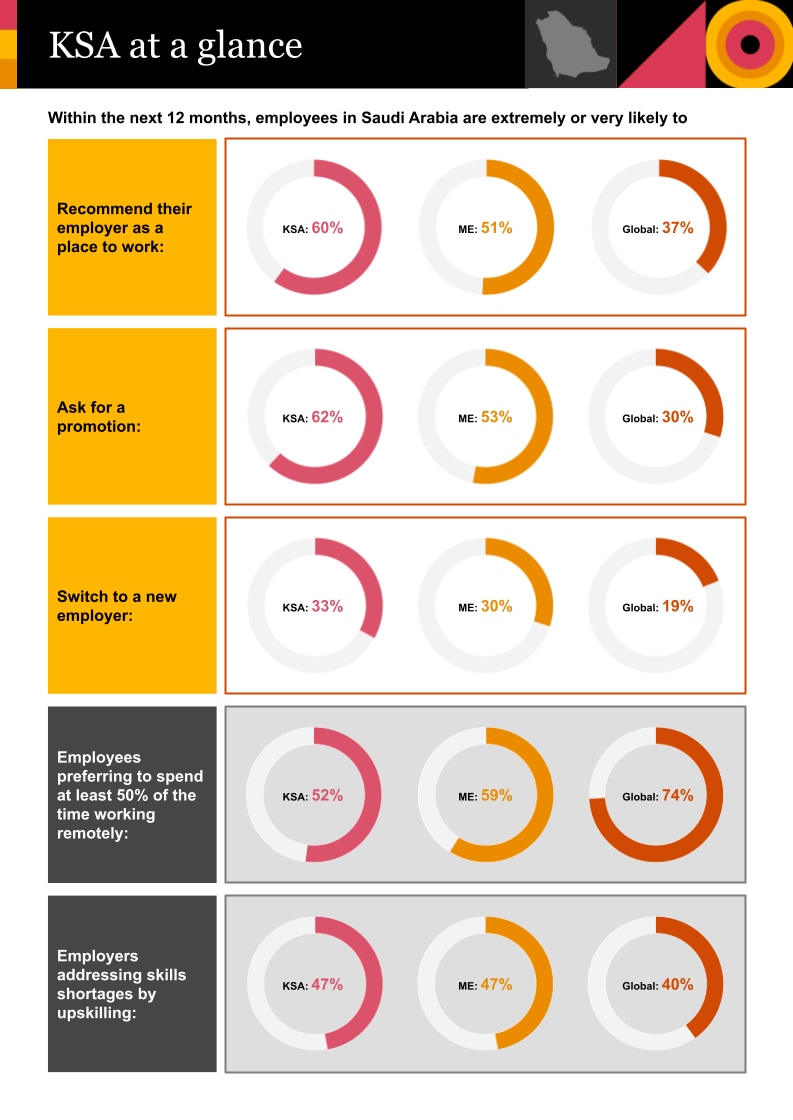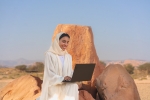This article was first published on Argaam
Employers are investing in digital skills to build a strong and capable workforce, and there is an appetite among the Kingdom’s employees to upskill further.
Equipping our people with the right digital skills to thrive in the workplaces of the future is one of the key economic and social pillars of Saudi Arabia’s Vision 2030. Success in delivering this goal helps diversify the economy away from oil, enabling the private sector to grow and continue attracting foreign investment, while engaging talented men and women alike to join the workforce.
With this in mind, our recent Hopes and Fears survey 2022 paints a positive picture of employers and employees advancing towards these goals in Saudi Arabia. The survey of over 52,000 people across 44 countries gauges workforce sentiment worldwide, and saw responses from 522 people in the Kingdom.
The profile of our respondents are educated and career-focused. Some 67% are university graduates and a further 21% hold a postgraduate qualification. That’s higher than the global survey figure of 59% of respondents educated to degree level or above.
There is also a sense of stability in the Saudi workforce, with 93% of respondents holding full-time jobs, and clear opportunities for progression - among the group, 13% held CEO or equivalent positions, 28% are senior executives (compared with 15% globally) and 32% are managers (27% globally).

Adapting to new ways of work
The good news for employers is that a significant proportion of respondents in Saudi Arabia are very satisfied at work – 40% compared with 28% globally and 38% across the Middle East. Responsiveness to new ways of working is part of this: employers in Saudi Arabia have acknowledged that office life has changed, and that employees now have an expectation of flexibility around where they work.
Currently, 51% of staff are working remotely at least half of the time, and a similar proportion expect to be doing the same a year from now. Only 30% of staff expect to be at work full-time and in person in 12 months time.
What drives the workforce agenda?
As the Kingdom evolves to meet its ambitions for Vision 2030, the market for skills is transforming as growth opportunities are created and industries develop,, for example in technology for the healthcare sector and in the construction of mega projects such as NEOM.
Some 47% of employers are training staff to be able to take on the tasks and roles where there are gaps in expertise, making upskilling the preferred approach to addressing skills shortages. This upskilling drive is higher than global averages at 40%, and on par with the Middle East region at large. Saudi employers are also increasing pay at a greater rate (40% vs 33% globally and 38% in the Middle East) and hiring a more diverse workforce (29% vs 25% globally and 28% in the Middle East). However there is some room for improvement, as employers in Saudi are slightly behind Middle East averages in terms of investing in technology to automate or enhance work (26% vs 32% in the Middle East) and offering support for employees’ physical and mental well-being (30% vs 33% in the Middle East).
There is undoubtedly an appetite among the young workforce for employers to go upskill and develop further. For example, some 38% of respondents said they were not being taught the technical or digital skills they needed to advance their career (28% globally and 25% in the Middle East), and 36% are concerned their role could be replaced by technology in the next three years ( 22% globally and 26% in the Middle East).
These responses show there is a clear opportunity for many KSA employers to double down on upskilling, both to meet the wishes of the workforce to enhance their skills and job satisfaction, and to address the challenge of finding people with the right experience, particularly to meet local employment targets within Saudi Arabia. There is an urgency to this – 33% of employees in Saudi Arabia said they are extremely or very likely to look for a new job in the next year, comparable to the figure of 30% across the Middle East as a whole.
What matters most at work?
Within the country’s rebounding job market, employees are feeling empowered and comparatively more confident in the value they add. For example, 62% of respondents are extremely or very likely to ask for a promotion (30% globally and 53% in the Middle East) and 59% to ask for a raise (35% globally and 54% locally). For employees in Saudi, financial reward is a big motivator (46%) followed closely by the ability to be creative and innovative (45%) and job fulfilment (42%).
In this way, the Saudi workforce is aligned with worldwide trends - our global survey showed that employees are thinking more carefully than ever about whether their career is fulfilling, and whether their employer’s values are in tune with their own. These questions have come to the fore after more than two years of volatility in the workplace, first as a result of Covid-19 and then the economic rebound, and with rapid transformation and technological change going on throughout.
We believe building trust is key to answering these challenges. The good news for Saudi employers is that there is a healthy degree of trust among their workforce - higher in fact than the global and regional averages: 34% said they are extremely confident their employer is transparent on health and safety issues (21% globally and 29% regionally), and 27% are extremely confident they are addressing diversity at work (25% globally and 16% in the Middle East).
Another 26% are extremely confident about the company’s transparency on its impact on the environment, and the same proportion said their employer is providing support and resources for employees to minimise the environmental impact of their job. This is important because sustainability is at the heart of Vision 2030 and the energy transition, with the Kingdom having committed to reaching net zero by 2060.
It is factors like these which contribute towards Saudi employers being more likely to recommend their employees - 60% are extremely or very likely to recommend their place of work, compared to 51% across the Middle East and only 37% globally.
Embracing the challenge of building a stronger workforce
Vision 2030 focuses on improving the lives of all citizens and building a resilient economy for the future. Addressing the hopes and fears of the workforce through upskilling, building trust and supporting the mental and physical wellbeing of employees are key parts of achieving those aims. Now is the time for organisations to capitalise on the readiness to upskill and optimism among their employees, and double down on building a fully engaged and motivated workforce that can achieve their full potential, to 2030 and beyond.
For more information, including the practical next steps to take, please see our Hopes and Fears survey 2022.







